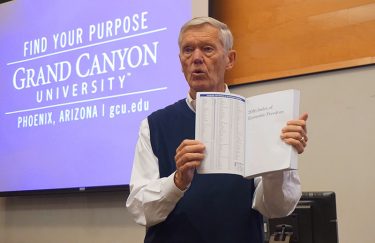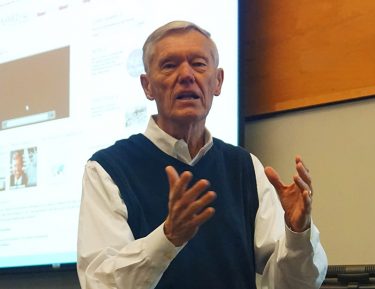Story and photos by Mark Heller
GCU News Bureau
Freedom is never “free.”

In six months, Dr. Barry Asmus will return to teaching this concept as a “bookend” to his world-renowned career in global economics. He spoke with Grand Canyon University’s Colangelo College of Business students Wednesday morning in the Antelope Gym lecture hall.
Asmus’ 70-minute discussion during CCOB assistant professor Tim Kelley’s “Introduction to Economics” class focused on the important correlation between citizen freedoms within countries and a nation’s economic prosperity. It’s one of several topics that soon will be daily discussion at GCU — Asmus will teach a 400-level “Poverty of Nations” economics class beginning in fall 2017.
Following a 20-year teaching career at Montana State and then Boise State, Asmus became a senior economist at the National Center for Policy Analysis. He has authored nine books and has spoken to thousands of companies and associations throughout the United States. He also has traveled extensively around the world for speeches and book research.
A half-dozen of those recent engagements included GCU President Brian Mueller, who was impressed with Asmus’ messages and delivery.
“I love this place,” Asmus said of GCU. “It’s bright and illuminating. Energy abounds, and a lot of that comes from (President) Mueller. He leads the parade.”

Hinting at what his 400-level class teachings might look like, Asmus shared his belief that a free society for all coupled with personal ownership and responsibility create a dynamic economy that often has been “worth dying for” since America’s independence in 1776.
Citing poverty as a nation’s “natural condition” from inception, the journey toward prosperity for America in the last 240 years is rooted in freedoms. Asmus referenced stark contrasts in quality of life between the former East Berlin and West Berlin in Germany or between the U.S. and, until the 1970s, China.
Many other parts of the world – notably sections of Eastern Europe, the Middle East and Africa – lack at least one of those basic tenets, which causes a ripple effect within a nation and its citizens’ freedoms.
By contrast, free markets boast “competition, communication and collaboration — a stupendous transmitter of ideas.”
It’s what Genesis 1:28 refers to as being fruitful, multiplying and prospering. Asmus used as an example the construction of a No. 2 pencil, which requires so many people and resources to harvest its materials, build, package and distribute.
Asmus harkened back to famed 18th-century author John Locke’s numerous books about politics, economics and philosophy, concepts put into action throughout American history beginning with Benjamin Franklin and reinforced through Abraham Lincoln.
“The world needs economic equality of freedom,” he said. “God wants us to flourish.”
Asmus plans to bring those principles and spirit to GCU.
“It’s a long process. There’s no magic,” he said of America’s personal and economic freedoms. “It’s not free. It’s costly, but it’s worth going up the mountain and fighting for.”
Contact Mark Heller at (602) 639-7516 or [email protected]









































































